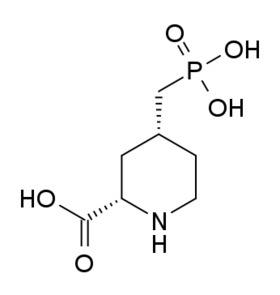Chemistry:Selfotel
From HandWiki
Short description: Chemical compound
 | |
| Clinical data | |
|---|---|
| Other names | Selfotel |
| Legal status | |
| Legal status |
|
| Identifiers | |
| |
| CAS Number | |
| PubChem CID | |
| IUPHAR/BPS | |
| ChemSpider | |
| UNII | |
| KEGG | |
| ChEMBL | |
| Chemical and physical data | |
| Formula | C7H14NO5P |
| Molar mass | 223.165 g·mol−1 |
| 3D model (JSmol) | |
| |
| |
| | |
Selfotel (CGS-19755) is a drug which acts as a competitive NMDA antagonist, directly competing with glutamate for binding to the receptor.[1] Initial studies showed it to have anticonvulsant, anxiolytic, analgesic and neuroprotective effects,[2][3] and it was originally researched for the treatment of stroke,[4] but subsequent animal and human studies showed phencyclidine-like effects,[5][6][7][8] as well as limited efficacy and evidence for possible neurotoxicity under some conditions,[9][10][11] and so clinical development was ultimately discontinued.[12][13]
References
- ↑ "CGS 19755, a selective and competitive N-methyl-D-aspartate-type excitatory amino acid receptor antagonist". The Journal of Pharmacology and Experimental Therapeutics 246 (1): 65–75. July 1988. PMID 2899170.
- ↑ "CGS 19755: a novel competitive N-methyl-D-aspartate (NMDA) receptor antagonist with anticonvulsant, anxiolytic and anti-ischemic properties". Progress in Clinical and Biological Research 361: 519–24. 1990. PMID 1981269.
- ↑ "Analgesic, anesthetic, and respiratory effects of the competitive N-methyl-D-aspartate (NMDA) antagonist CGS 19755 in rhesus monkeys". Brain Research 526 (2): 355–8. September 1990. doi:10.1016/0006-8993(90)91247-e. PMID 2257491.
- ↑ "Safety and tolerability of the glutamate antagonist CGS 19755 (Selfotel) in patients with acute ischemic stroke. Results of a phase IIa randomized trial". Stroke 26 (4): 602–5. April 1995. doi:10.1161/01.str.26.4.602. PMID 7709405.
- ↑ "Behavioral pharmacological profile of CGS 19755, a competitive antagonist at N-methyl-D-aspartate receptors". The Journal of Pharmacology and Experimental Therapeutics 250 (2): 454–60. August 1989. PMID 2547931.
- ↑ "N-methyl-D-aspartate antagonism and phencyclidine-like activity: a drug discrimination analysis". The Journal of Pharmacology and Experimental Therapeutics 253 (3): 1017–25. June 1990. PMID 2193142.
- ↑ "Tolerance to the cataleptic effect of the N-methyl-D-aspartate (NMDA) receptor antagonists in pigeons: cross-tolerance between PCP-like compounds and competitive NMDA antagonists". The Journal of Pharmacology and Experimental Therapeutics 263 (2): 499–504. November 1992. PMID 1432686.
- ↑ "Competitive and uncompetitive N-methyl-D-aspartate antagonist discriminations in pigeons: CGS 19755 and phencyclidine". Psychopharmacology 118 (1): 42–51. March 1995. doi:10.1007/bf02245248. PMID 7597121.
- ↑ "Failure of the competitive N-methyl-D-aspartate antagonist Selfotel (CGS 19755) in the treatment of severe head injury: results of two phase III clinical trials. The Selfotel Investigators". Journal of Neurosurgery 91 (5): 737–43. November 1999. doi:10.3171/jns.1999.91.5.0737. PMID 10541229.
- ↑ "Selfotel in acute ischemic stroke : possible neurotoxic effects of an NMDA antagonist". Stroke 31 (2): 347–54. February 2000. doi:10.1161/01.str.31.2.347. PMID 10657404.
- ↑ "A comparative assessment of the efficacy and side-effect liability of neuroprotective compounds in experimental stroke". Brain Research 892 (2): 344–50. February 2001. doi:10.1016/s0006-8993(00)03269-8. PMID 11172782.
- ↑ "Why did NMDA receptor antagonists fail clinical trials for stroke and traumatic brain injury?". The Lancet. Neurology 1 (6): 383–6. October 2002. doi:10.1016/s1474-4422(02)00164-3. PMID 12849400.
- ↑ "Lessons from epidemiologic studies in clinical trials of traumatic brain injury". Mechanisms of Secondary Brain Damage from Trauma and Ischemia. 89. 2004. 101–7. doi:10.1007/978-3-7091-0603-7_14. ISBN 978-3-7091-7206-3.
 |
